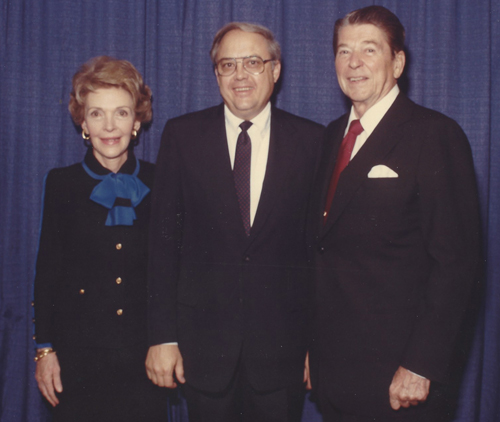It was so hush-hush that even his wife was kept in the dark. “She knew I was acting awfully strange. I don’t know if she thought I was carrying on an affair or what.” So recalled Joseph “Joe” Whittle, U.S Attorney for the Western District of Kentucky, of his immersion in an ultra-secret investigation of bribery and corruption in the Kentucky General Assembly.
Confirmed as U.S. Attorney under President Ronald Reagan in 1986, the Grayson County native had worked to enlarge and modernize his office, prosecute civil rights and environmental cases, and collect debts owed the government through the forfeiture of assets derived from crime. But this corruption case, opened in 1990, promised to be his most consequential. The FBI had learned that some Kentucky legislators, particularly members of the Business, Organization, and Professions Committees (BOP), were willing to sell their votes in connection with the regulation of horse racing (the “trot”). To collar the wrongdoers, the feds launched Operation BOPTROT.
The undercover sting – which featured secret tape recordings, drops of cash marked with invisible ink, and the flipping of a suspect by showing him FBI file cabinets supposedly filled with incriminating evidence – was highly productive. From 1992-1995, some 17 legislators, including the House Speaker and Senate Minority Leader, were charged and convicted of bribery, conspiracy, extortion, racketeering, and lying to the FBI.
About halfway through the investigation, however, President George H.W. Bush (who had reappointed Whittle as U.S. Attorney), lost his reelection bid to Bill Clinton. Although it was Clinton’s prerogative to replace U.S. Attorneys as his own nominees were confirmed, his new Attorney General, Janet Reno, surprised all 93 incumbents by demanding their immediate resignations. Despite warnings that some critical investigations, including BOPTROT, might be disrupted, all stepped down, including Whittle, who left office in July 1993. Many of his fellow U.S. Attorneys exchanged farewell letters with Whittle, advising of future plans and testifying to the pride they had taken in their work representing the United States.
Joe Whittle has recently donated to WKU’s Special Collections Library a collection of his correspondence, clippings and personal items covering his early legal career and his tenure as U.S. Attorney for the Western District of Kentucky. Included are speeches recalling his work on Operation BOPTROT, the history of the U.S. Attorney’s office, and summaries of his achievements. A couple of unusual items also appear. In 1985, a 38-year-old Illinois rabbi and diamond dealer disappeared while in Louisville on business. An investigation pointed to his murder, but his body remained missing for years. In the meantime, Whittle helped provide enough evidence to satisfy Jewish religious authorities that his widow was eligible to remarry. Another item is a list of predictions for 2050 prepared by Whittle in 1985 and placed in a time capsule at the Leitchfield Deposit Bank in Grayson County. Some of them proved remarkably tuned in to the future. He imagined that “80% of homes had personal computers which were used for communications, electronic mail, electronic banking and to control electrical and electronic devices”; that “most telephones were wireless and were carried on the person so that he or she could be reached by telephone wherever they might be”; and that “many people traveled within a fifty mile radius by way of electric powered automobiles and that it had become necessary by the year 2050 to restrict the use of internal combustion engines because of environmental considerations.”
Click here to access a finding aid for Joe Whittle’s papers held in WKU’s Special Collections Library. For more of our collections, search TopSCHOLAR and KenCat.


